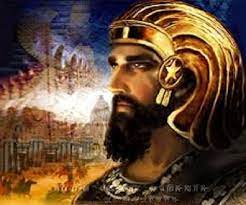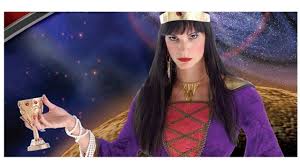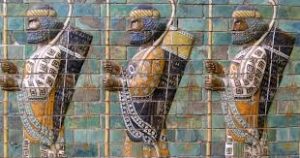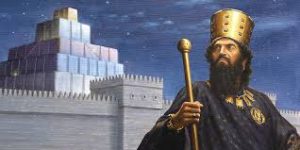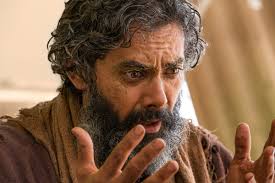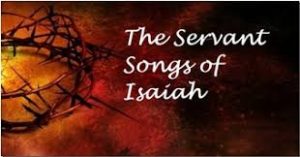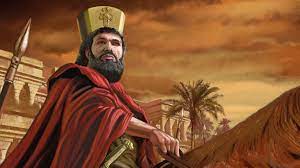Ib – Cyrus is My Shepherd and Will Accomplish All that I Please 44: 24-28
Cyrus is My Shepherd
and Will Accomplish All that I Please
44: 24-28
Cyrus is My shepherd and will accomplish all that I please DIG: What truth about God is stressed here? How do these truths confirm the promises given? As an exile who had no freedom to leave Babylon, much less consider rebuilding Jerusalem, would you have responded to these promises with hope or with cynicism? In light of this, how might the exiles feel as they heard rumors of Cyrus’ conquests and approach to Babylon? What does that imply about the relationship between God’s actions and Cyrus’ plans?
REFLECT: Here the LORD is emphasizing the faithfulness, the surety, the reliability and the promises of His written Word through the prophets, His messengers. If you are a believer, His Word contains promises to you about your future with Him. What do you believe about these promises? Some have said, “The Bible says it, I believe it, and that does it!” Does that characterize you? Or do you have doubts? As you read about God’s promise of deliverance to the Israelites from the Babylon Captivity, and His faithfulness to them, how does that make you feel about His faithfulness to you?
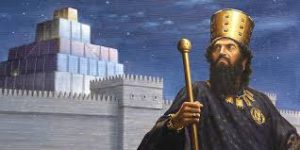
The second half of the book of Isaiah is a message of comfort. Here God announces through His prophet the deliverance of the Jews by a Persian emperor named Cyrus (see the commentary on Dani’el, to see link click Ag – Cyrus and Darius). In the Hebrew text this is all one sentence. It is one of the longest sentences in the Hebrew text. First, he describes the LORD’s authority by saying: This is what ADONAI says (44:24a). We see that phrase again in 45:1, 11, 14 and 18. It is usually used to bring about confidence in the promises of God to redeem and deliver. This phrase underscores that these are the very words of God.
Then the LORD asserts: I am your Redeemer (44:24b, also see 43:14). He is Isra’el’s go’el, the Next-of-Kin, pledged to take and bear her every burden as His own (see the commentary on Ruth, to see link click Ax – Ruth and Boaz on the Threshing Floor). She is His family by His will. James, Yeshua’s half-brother, wrote to the twelve tribes scattered among the nations saying: He chose to give us birth through the Word of truth, that we might be a kind of first fruits of all He created (James 1:18). Isaiah then describes Isra’el’s special relationship with the LORD ten times by starting each sentence with the word who.
(1) Who formed you in the womb (44:24d). In the abortion debate people often argue about exactly when life begins. The Bible is very clear that life begins in the womb (Psalm 139:13-16; Isaiah 43:1, 7 and 21, 44:2 and 24; Jer 1:5 and 20:17). David would say: From my mother’s womb you have been my God (Psalm 22:10b).
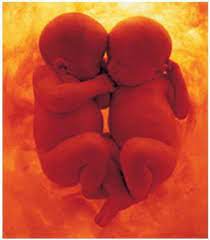
In a mother’s womb were two babies. One asked the other: “Do you believe in life after delivery?” The other replied, “Why, of course. There has to be something after delivery. Maybe we are here to prepare ourselves for what we will be later.”
“Nonsense” said the first. “There is no life after delivery. What kind of life would that be?”
The second said, “I don’t know, but there will be more light than here. Maybe we will walk with our legs and eat from our mouths. Maybe we will have other senses that we can’t understand now.”
The first replied, “That is absurd. Walking is impossible. And eating with our mouths? Ridiculous! The umbilical cord supplies nutrition and everything we need. But the umbilical cord is so short. Life after delivery is to be logically excluded.”
The second insisted, “Well I think there is something and maybe it’s different than it is here. Maybe we won’t need this physical cord anymore.”
The first replied, “Nonsense. And moreover if there is life, then why has no one ever come back from there? Delivery is the end of life, and in the after-delivery there is nothing but darkness and silence and oblivion. It takes us nowhere.”
“Well, I don’t know,” said the second, “but certainly we will meet Mother and she will take care of us.”
The first replied “Mother? You actually believe in Mother? That’s laughable. If Mother exists then where is She now?”
The second said, “She is all around us. We are surrounded by her. We are of Her. It is in Her that we live. Without Her this world would not and could not exist.”
Said the first: “Well I don’t see Her, so it is only logical that She doesn’t exist.”
To which the second replied, “Sometimes, when you’re in silence and you focus and listen, you can perceive Her presence, and you can hear Her loving voice, calling down from above.”
If you are a believer in the God of Abraham, Isaac and Jacob, I would caution you to believe in, and follow, the LORD’s Word to you rather than the lies of our current generation.
(2) Who had made all things (44:24c). Not only has the LORD made Isra’el, but He has also made all things without any assistance or advice (40:12-14 and 21-22). The fact that ADONAI is Isra’el’s Maker suggests that He would protect her and not see her destroyed. All creation has a relationship with God, but the people of Isra’el have a special relationship with Him. She is, after all, the apple of His eye (Deuteronomy 32:10c).
(3) Who alone stretched out the heavens and laid the foundations of the earth (44:24d and 51:13). Regarding stretching out the heavens (see the commentary on Genesis Ak – So God Made the Expanse Between the Waters), and for laying the foundations of the earth (see the commentary on GenesisAl – God Called the Dry Ground Land and Gathered the Waters He Called Seas). In other words, His continuing work as the Creator guarantees that He is in sole charge of everything (40:26), and there is no other God (Ps 96:5).
(4) Who spread out the earth by Myself (44:24e). And God blessed the seventh day and made it holy, because on it He rested from all the work of creating that He had done (see my commentary on Genesis Aq – By the Seventh Day God Had Finished His Work). The point is that ADONAI is responsible for the existence of the world as we know it.
(5) Who foils the signs of false prophets (44:25a). The Hebrew word for false prophets here means babblers. It is used in Isaiah 16:6, Job 11:3 and Jeremiah 48:30 in the sense of idle talk. But here and in Jeremiah 50:36 it is used of exaggerated claims of fortunetellers. They made false prophecies by their relationship with the demonic world and makes fools of diviners, or those who try to figure out the future by asking their gods of wood and stone. In both cases Ha’Shem is the frustrater of the occult. The false prophets are exposed because, like Hananiah (see the commentary on Jeremiah Et – The False Prophet Hananiah), what they prophesy does not come to pass.
(6) Who overthrows the learning of the wise. Regardless of what age they live in, the wise think they are hot stuff. I don’t know where you live, but there’s plenty of that going around in my neck-of-the-woods. But the Bible says: Do you see a man wise in his own eyes? There is more hope for a fool than for him (Proverbs 26:12). Isaiah had warned against this earlier (see Bi – Woe To Those Who Are Wise In Their Own Eyes). The LORD always turns man’s wisdom into nonsense (44:25b). The counselors of the king of Babylon who said God could not release His people would be proven foolish when God’s predictions were fulfilled. For the foolishness of God is wiser than man’s wisdom, and the weakness of God is stronger than man’s strength (First Corinthians 1:18-25).
Adoniram Judson graduated at the top of his class in college, and then he headed to New York City to seek fame and fortune as an actor and/or writer. He had left the God of his father, thinking he was beyond such “primitive notions.” But such a life was empty for him. He was disillusioned, so he headed back to his home in Plymouth, Massachusetts, stopping for a night at a wayside inn. Adoniram had trouble sleeping that night, because a man in the next room was critically ill and moaning and groaning in pain. Obviously, his neighbor in the next room was dying. In the darkness of his room, Adoniram thought about the possibility of his own death and whether he was prepared for it. At times during the long hours he thought about returning to the Christian beliefs of his father, but then he imagined what his college friend Jacob Eames would say about his father’s faith. How he ridiculed God and anyone who would believe in such nonsense. He waited for morning to come so that the terrors of the night would be forgotten. Early the next morning, Adoniram went to the innkeeper.” That poor old man in the next room. How is he?” he asked. He passed away early this morning,” came the reply. “And he wasn’t old at all. He was a young man, about your age.” For some reason, Adoniram asked, “What was his name?” It was a rather stupid question, because Adoniram certainly didn’t know anyone in that section of the country. The innkeeper replied, “His name was Jacob Eames.” It was Adoniram’s college friend whose skepticism had turned Adoniram against the faith of his father. Dazed, Adoniram Judson returned to Massachusetts and to his father where after three months of a mental and spiritual battle, he “made a solemn dedication of himself to God.”
(7) Who carries out the counsel of His servants and fulfills the predictions of His messengers (44:26a). So, while the prophets of the Babylonian deities were frustrated because their predictions did not come true, ADONAI was able to confirm the words of His prophets, or His messengers. Isaiah insists that the LORD forms His own counsel and communicates His plans and desires through His prophets. God’s plans, unlike the king’s advisors, are not determined by stars or shapes of animal intestines, but by His holy character. His ultimate purposes are always good because God alone is good (Mark 10:17-18). Meditate on Psalm 34:8; 119:68; 2 Thessalonians 1:11 and James 1:17).
(8) Who says of Jerusalem, ‘It shall be inhabited’ of towns of Judah, ‘They shall be built,’ and of their ruins, ‘I will restore them’ (44:26b). ADONAI is the One who prophesies the return from Babylon. Through the prophets, His messengers, He said Jerusalem would again have people living in it, and indeed it would! The true prophet of God always conveys the certainty of His divine will (Deuteronomy 18:20-22).
(9) Who says to the watery deep, ‘Be dry, and I will dry up your streams’ (44:27). This watery deep is an allusion to the crossing of the Sea of Reeds (see my commentary on Exodus Ci – The Waters Were Divided and the Israelites Went Through the Sea on Dry Land). Can the LORD really restore Jerusalem, as He had said? It was as if ADONAI was saying, “Consider the exodus. If I can dry up the great watery deep, is there anything I can’t do?” God removed all Pharaoh’s obstacles, and in the same way all obstacles for the Israelites to return to Jerusalem would be removed.
(10) Who says of Cyrus, He is My shepherd (44:28a). This verse now clears up the hints that first appeared in 41:23 and 41:25. Who was it that the LORD called from the north and the east to subdue the Gentile nations and to set His heavyhearted people free? It was the Persian emperor Cyrus. In the first year of Cyrus king of Persia (538 BC), in order to fulfill the word of YHVH spoken by Jeremiah, God moved the heart of Cyrus king of Persia to make a proclamation throughout his realm and to put it in writing:
This is what Cyrus king of Persia says: ADONAI, the God of heaven, has given me all the kingdoms of the earth and has appointed me to build a Temple for Him at Jerusalem in Judah. Anyone of His people among you – may his God be with him, and let him go to Jerusalem in Judah (Ezra 1:2-3a). As a result, the first return of 49,897 exiles under Zerubbabel (with the intention of rebuilding the Temple) took place that same year (Ezra 2). Two years later in 536 BC, the bronze altar and Temple foundations were built (Ezra 3:1 to 4:5).
It is important to understand that Cyrus was not a true believer in the God of Abraham, Isaac and Jacob. ADONAI accepted and understood this fact when He declared: You do not acknowledge Me (45:4b). The concern of the Persian king was to establish strong buffer states around his empire that would be loyal to him. Also, by having his subjects resettled in their own countries he hoped to have the gods in various parts of his empire praying for him to his gods Bel and Nebo. The famous Cyrus Cylinder (538 BC), which records his capture of Babylon and his program for repatriating his subjects in their homelands, includes this damning statement, “May all the gods whom I have resettled in their sacred cities daily ask Bel and Nebo for a long life for me.” Therefore, we can see that the fulfillment of Jeremiah’s words: When seventy years are completed for Babylon, I will come to you and fulfill My gracious promise to bring you back to this place (Jeremiah 29:10), were totally God’s doing.
The title that Isaiah gives him here is My shepherd. Cyrus will look after the interests of Isra’el as a shepherd looks after his flocks. By calling him My Shepherd, the Spirit of God indicates that Cyrus is going to perform shepherd duties for Isra’el. ADONAI will not only give them the right to go back to Jerusalem, but actually provide for them to do so. The whole argument against the idols is that they cannot tell the future. Nothing they supposedly said in the past can remotely explain the present, and nothing they could possibly say today is more than a mere rehash of the past.
And He will accomplish all that I please; he will say of Jerusalem, ‘Let it be rebuilt,’ and of the Temple, ‘Let its foundations be laid’ (44:28b). In addition, God says that Cyrus will accomplish all that I please. That which Cyrus has ordained and decreed, Cyrus will carry out. What has the LORD decreed? Concerning Jerusalem, let it be rebuilt; concerning the Temple, let its foundations be laid. Josephus, the ancient Jewish historian, who wrote about 75AD to 80AD, said that it was this passage that Dani’el the prophet showed to Cyrus the Great. When Cyrus read the prophecy and understood that his name was prophesied about 200 years earlier, ADONAI moved his heart and Cyrus issued the decree for the Israelites to go back to the city of Jerusalem.
God, through Isaiah, gives a near historical prophecy that clarified the allusions that first appeared in 41:2-3 and again in 41:25. Who was it that the LORD called from the north and the east to terrify the nations and return His people to the Land? It was Cyrus the Persian emperor. Remember that Cyrus was named and identified almost two hundred years before this prophecy was made. Yet, God was so specific that He was able to name the very Persian monarch that would bring an end to the Babylonian empire, and give the Jews the right to return to Judah. The contrast to the idols is stark. They could do no such thing.
One can only imagine what the Israelites thought when ADONAI called that pagan king, My shepherd. They believed that only David could shepherd God’s people (2 Samuel 5:2; Ezekiel 34:23). How could this be? The next three files tells the story. In Ic – This is What the LORD says to Cyrus His Anointed; Id – I Will Rise Up Cyrus in My Righteousness, I Will Make All His Ways Straight; and Ie – Turn to Me and Be Saved, For I Am God and there is No Other. God will give both a near historical prophecy concerning the coming of Cyrus, and, to reassure Isra’el of His ultimate plan for them, a far eschatological prophecy about her place in the Messianic Kingdom. They could rest assured; the calling of Cyrus was all part of their ultimate redemption.
Even if the house of David had fractured their relationship with the LORD (7:13, 39:7), He would find a new way to keep His Covenant with them (Deuteronomy 29). In an ironic twist that only the LORD could orchestrate, just as a foreigner, Ruth, became an ancestress of David (Ruth 4:13-22), the foreigner Cyrus was a snap-shot of the Davidic Messiah who would say: I am the good Shepherd (John 10:11).



